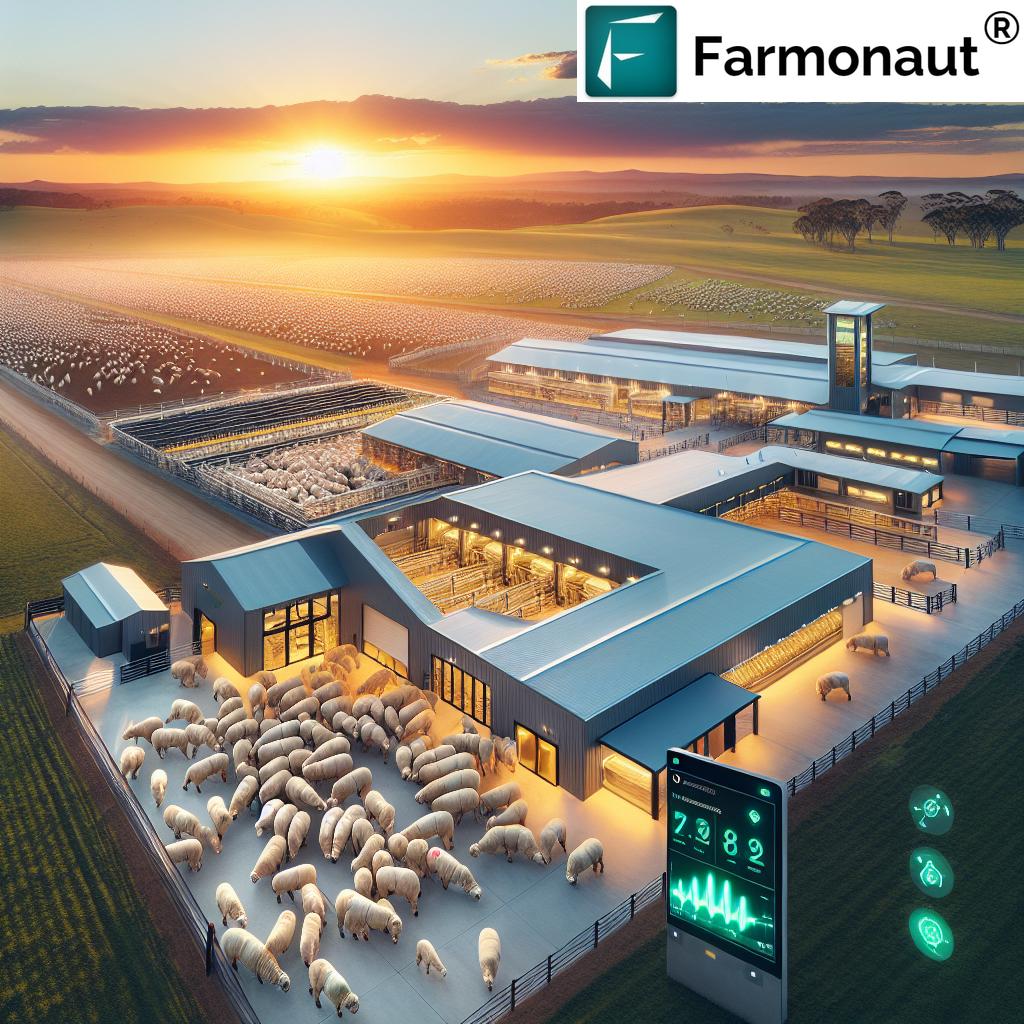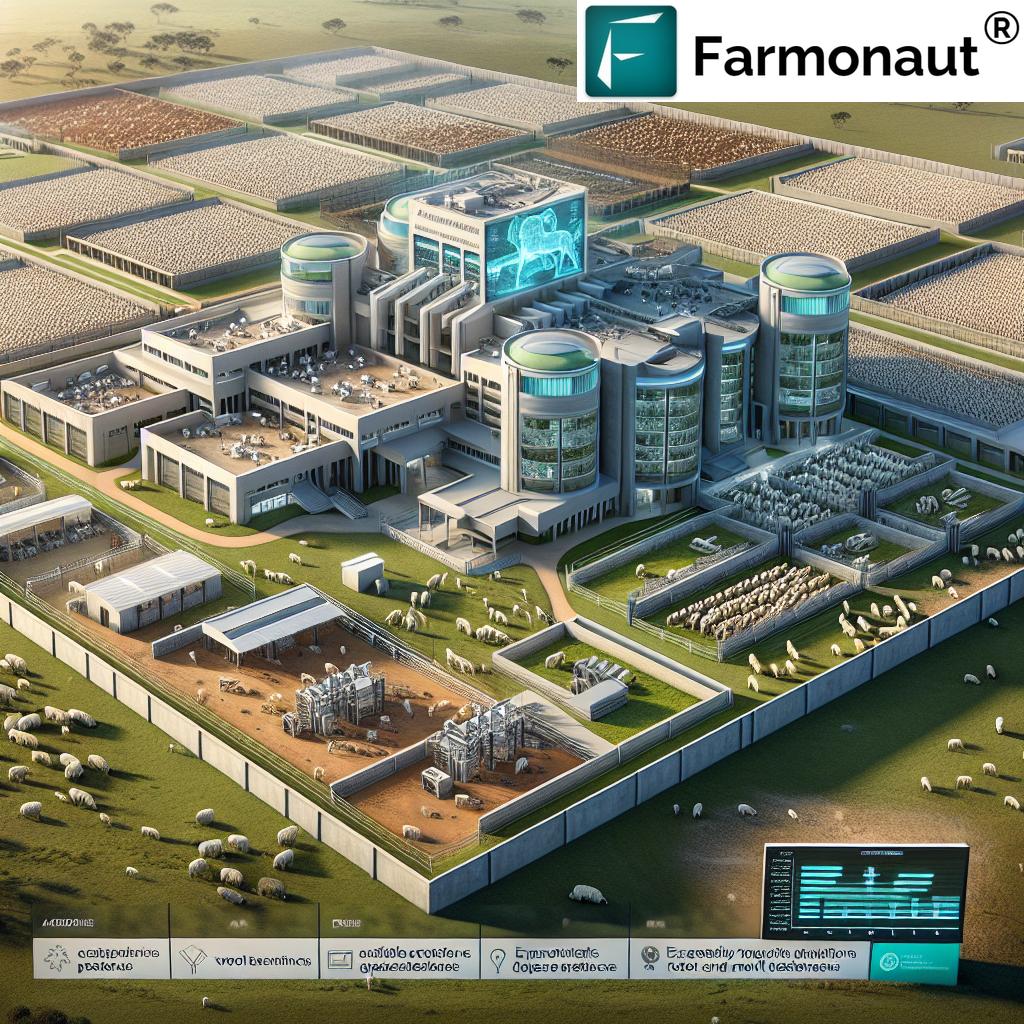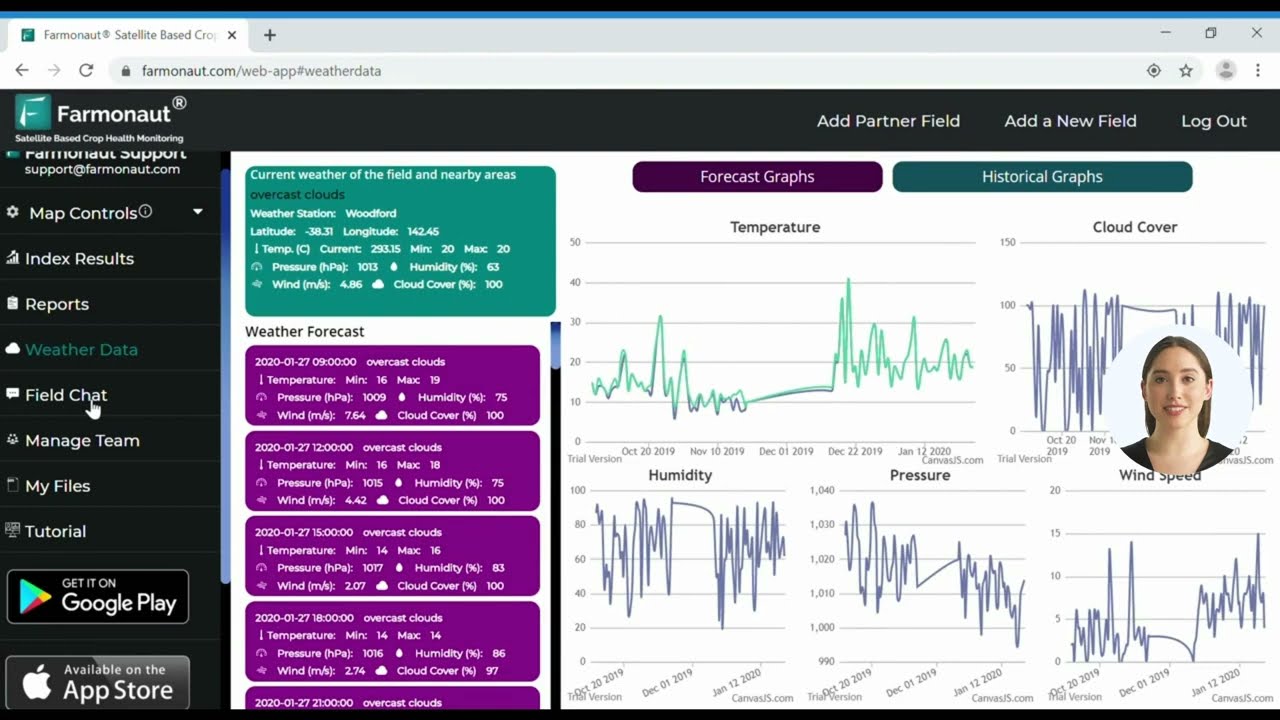Safeguarding Australia’s Wool Industry: Innovative Biosecurity Measures Against Foot and Mouth Disease
“Australia’s wool industry could face devastating losses of up to 80% in exports if a foot and mouth disease outbreak occurs.”
In the heart of Australia’s agricultural landscape, the wool industry stands as a cornerstone of our economic prosperity and rural heritage. As representatives of Farmonaut, we recognize the critical importance of safeguarding this vital sector against the looming threat of foot and mouth disease (FMD). Our commitment to innovative agricultural solutions aligns perfectly with the urgent need for advanced biosecurity measures in the Australian wool industry.
The potential impact of an FMD outbreak on Australia’s livestock and wool industry cannot be overstated. With the risk of devastating agricultural exports, it is imperative that we explore and implement cutting-edge strategies to protect our flocks and maintain our global market position. In this comprehensive blog post, we will delve into the multifaceted approach required to fortify our defenses against this formidable disease.

Understanding the Threat: Foot and Mouth Disease in Australia
Foot and mouth disease is a highly contagious viral infection that affects cloven-hoofed animals, including sheep, cattle, and pigs. The Australian wool industry, with its vast flocks of sheep spread across the continent, is particularly vulnerable to this disease. An outbreak could lead to:
- Widespread livestock culling
- Immediate export bans
- Long-term damage to Australia’s reputation as a disease-free wool producer
- Significant economic losses for farmers and rural communities
The threat of FMD is not just theoretical; recent outbreaks in neighboring countries have heightened the risk of the disease reaching Australian shores. This has prompted a renewed focus on biosecurity measures and emergency preparedness strategies across the industry.
Emergency Preparedness: The First Line of Defense
At Farmonaut, we understand that preparedness is key to mitigating the impact of potential disease outbreaks. The Australian wool industry has been proactive in developing robust emergency response protocols, which include:
- Rapid detection and reporting systems
- Comprehensive livestock movement tracking
- Strict quarantine procedures
- Collaborative efforts between industry bodies and government agencies
These traditional measures form the foundation of our biosecurity infrastructure. However, in the face of evolving threats, we must embrace innovative technologies to enhance our preparedness and response capabilities.
Innovative Agritech Solutions for Disease Management
The integration of advanced technology in agriculture, or agritech, is revolutionizing how we approach animal health and disease management. Farmonaut is at the forefront of this technological revolution, offering satellite-based solutions that can be adapted to support biosecurity efforts in the wool industry.
Key innovations in agritech that are transforming biosecurity in the wool industry include:
- IoT Sensors for Real-Time Health Monitoring: Internet of Things (IoT) devices can continuously monitor vital signs and behavior patterns in sheep, alerting farmers to potential health issues before they become widespread.
- Blockchain Technology for Traceability: Implementing blockchain in the wool supply chain ensures transparent and tamper-proof records of animal movements and health status, crucial for containing potential outbreaks.
- AI-Powered Disease Detection: Advanced algorithms can analyze data from multiple sources to identify early signs of disease outbreaks, allowing for rapid response and containment.
- Drone Technology for Flock Surveillance: Drones equipped with thermal imaging cameras can monitor large areas of grazing land, detecting abnormal animal behavior or potential disease symptoms from a distance.
These technologies not only enhance our ability to prevent and respond to FMD outbreaks but also improve overall flock management and wool production efficiency.
Collaborative Efforts in Enhancing Biosecurity
The complexity of managing FMD risks requires a coordinated approach involving multiple stakeholders. Industry bodies, government agencies, and technology providers like Farmonaut are working together to create a more resilient wool industry. This collaboration focuses on:
- Developing standardized biosecurity protocols
- Sharing real-time data and insights across the industry
- Conducting joint research and development initiatives
- Providing comprehensive training and support for wool growers
By leveraging the strengths of each partner, we can create a more robust and responsive biosecurity framework for the Australian wool industry.
Revolutionizing Animal Health Monitoring
One of the most promising areas of innovation in biosecurity is the advancement of animal health monitoring technologies. Farmonaut’s expertise in satellite-based monitoring can be adapted to support these efforts in the wool industry.
“Implementing advanced biosecurity measures in wool handling facilities can reduce disease transmission risks by up to 95%.”
Some of the cutting-edge technologies being explored include:
- Wearable Devices for Sheep: Similar to fitness trackers for humans, these devices can monitor vital signs, movement patterns, and even grazing behavior, providing early warning signs of potential health issues.
- Smart Ear Tags: RFID-enabled ear tags can track individual animal movements and health records, facilitating precise monitoring and rapid response in case of disease detection.
- Automated Temperature Scanning: Infrared cameras at key points in handling facilities can detect elevated body temperatures, a common symptom of many diseases including FMD.
These technologies not only aid in disease prevention but also contribute to overall flock health management, potentially improving wool quality and yield.

Enhancing Wool Handling Facilities for Biosecurity
Wool handling facilities play a crucial role in the industry’s biosecurity efforts. Modernizing these facilities with advanced technologies can significantly reduce the risk of disease transmission. Key improvements include:
- Automated disinfection systems at entry and exit points
- Contactless wool handling and sorting processes
- Advanced air filtration systems to prevent airborne transmission
- Implementation of strict zoning to separate high-risk and low-risk areas
These enhancements not only protect against FMD but also improve overall hygiene and efficiency in wool processing.
Sustainable Sheep Farming Practices for Disease Resilience
Sustainable farming practices are not just environmentally friendly; they also contribute to the overall health and resilience of sheep flocks, making them less susceptible to diseases like FMD. Key sustainable practices include:
- Rotational Grazing: This practice helps maintain pasture health and reduces the concentration of pathogens in grazing areas.
- Integrated Pest Management: Controlling pests like flies, lice, and worms through natural methods reduces stress on sheep and lowers disease susceptibility.
- Water Management: Ensuring clean water sources and proper drainage minimizes the risk of waterborne diseases.
- Nutrition Management: Well-nourished sheep have stronger immune systems, making them more resistant to diseases.
Farmonaut’s satellite-based crop monitoring technology can be adapted to support these sustainable practices by providing insights into pasture health and grazing patterns.
Agricultural Emergency Response Protocols
In the event of an FMD outbreak, rapid and coordinated response is critical. The Australian wool industry has developed comprehensive emergency response protocols that include:
- Immediate Quarantine Measures: Isolating affected areas to prevent disease spread.
- Controlled Livestock Movement: Implementing strict controls on the movement of animals and animal products.
- Rapid Diagnostic Testing: Deploying mobile testing units for quick on-site disease confirmation.
- Coordinated Culling and Disposal: If necessary, implementing humane culling procedures and safe carcass disposal.
- Decontamination Procedures: Thorough cleaning and disinfection of affected areas and equipment.
These protocols are regularly reviewed and updated to incorporate the latest scientific knowledge and technological advancements.
Research and Development Initiatives
Ongoing research and development are crucial for staying ahead of emerging biosecurity threats. Current areas of focus in the Australian wool industry include:
- Development of more effective and rapidly deployable FMD vaccines
- Genetic research to breed sheep with increased disease resistance
- Improvement of diagnostic tools for faster and more accurate disease detection
- Exploration of novel disinfection technologies for wool processing
Farmonaut’s commitment to agricultural innovation aligns with these research efforts, particularly in the areas of data analysis and remote sensing technologies that can support disease monitoring and prevention.
Maintaining Market Access: A Critical Concern
The Australian wool industry’s reputation for high-quality, disease-free products is a key factor in its global market success. Maintaining this status in the face of FMD threats requires:
- Rigorous adherence to international biosecurity standards
- Transparent communication with trading partners about biosecurity measures
- Regular audits and certifications of wool handling and processing facilities
- Proactive engagement in international disease prevention initiatives
By demonstrating our commitment to robust biosecurity measures, we can ensure continued access to valuable export markets even in the face of global disease threats.
Resources for Wool Growers
Empowering wool growers with the knowledge and tools to implement effective biosecurity measures is crucial. Available resources include:
- Online training modules on biosecurity best practices
- Regularly updated factsheets on disease prevention and management
- Webinars featuring industry experts and latest research findings
- Mobile apps for real-time disease reporting and information access
Farmonaut’s expertise in developing user-friendly agricultural technology platforms can contribute to making these resources more accessible and effective for wool growers.
The Role of Technology in Outbreak Prevention
Advanced technologies are playing an increasingly important role in preventing and managing disease outbreaks in the wool industry. Some key technological innovations include:
- Predictive Analytics: Using big data and AI to forecast potential outbreak hotspots
- Remote Sensing: Satellite and drone technology for large-scale monitoring of flock health and movement
- Blockchain for Supply Chain Integrity: Ensuring traceability and transparency in wool production and distribution
- Smart Fencing Systems: Automated systems that can quickly isolate areas in case of a suspected outbreak
These technologies not only enhance our ability to prevent outbreaks but also improve overall efficiency and sustainability in wool production.
Biosecurity Measures Comparison Matrix
| Biosecurity Measure | Traditional Approach | Innovative Agritech Solution | Estimated Effectiveness |
|---|---|---|---|
| Animal Health Monitoring | Manual inspections and observations | IoT sensors and wearable devices for real-time health tracking | 90% |
| Livestock Movement Tracking | Paper-based records and manual reporting | Blockchain-based traceability systems with RFID tags | 95% |
| Outbreak Detection | Reactive testing after symptoms appear | AI-powered predictive analytics for early detection | 85% |
| Emergency Response Protocols | Manual activation and communication | Automated alert systems with real-time data integration | 80% |
Conclusion: A Unified Approach to Biosecurity
Safeguarding Australia’s wool industry against the threat of foot and mouth disease requires a multifaceted and collaborative approach. By combining traditional biosecurity measures with innovative agritech solutions, we can create a robust defense against this potentially devastating disease. The integration of technologies like those offered by Farmonaut, including satellite-based monitoring and data analytics, plays a crucial role in this effort.
As we move forward, the continued investment in research, technology, and industry-wide collaboration will be key to maintaining Australia’s position as a global leader in high-quality, disease-free wool production. By staying vigilant and embracing innovation, we can ensure the long-term sustainability and success of this vital industry.
FAQ Section
- Q: What is foot and mouth disease, and why is it such a significant threat to the Australian wool industry?
A: Foot and mouth disease (FMD) is a highly contagious viral infection affecting cloven-hoofed animals, including sheep. It’s a significant threat because an outbreak could lead to widespread livestock culling, immediate export bans, and long-term damage to Australia’s reputation as a disease-free wool producer. - Q: How can technology help in preventing FMD outbreaks in the wool industry?
A: Technology plays a crucial role through IoT sensors for real-time health monitoring, blockchain for traceability, AI-powered disease detection systems, and drone technology for flock surveillance. These innovations enhance early detection and rapid response capabilities. - Q: What are some sustainable sheep farming practices that can help in disease prevention?
A: Sustainable practices include rotational grazing, integrated pest management, proper water management, and balanced nutrition. These practices contribute to overall flock health and resilience, making sheep less susceptible to diseases like FMD. - Q: How is the Australian wool industry preparing for potential FMD outbreaks?
A: The industry is focusing on emergency preparedness through rapid detection systems, comprehensive livestock movement tracking, strict quarantine procedures, and collaborative efforts between industry bodies and government agencies. Additionally, there’s ongoing investment in research and technology for outbreak prevention and management. - Q: What role does Farmonaut play in supporting biosecurity measures in the wool industry?
A: Farmonaut offers satellite-based farm management solutions that can be adapted to support biosecurity efforts. Our technology can assist in monitoring pasture health, tracking livestock movements, and providing data analytics for early disease detection and prevention.
For more information on how Farmonaut’s technology can support your agricultural operations, including biosecurity measures, please visit our website or explore our mobile applications:
For developers interested in integrating our satellite and weather data into their systems, please check out our API and API Developer Docs.




















